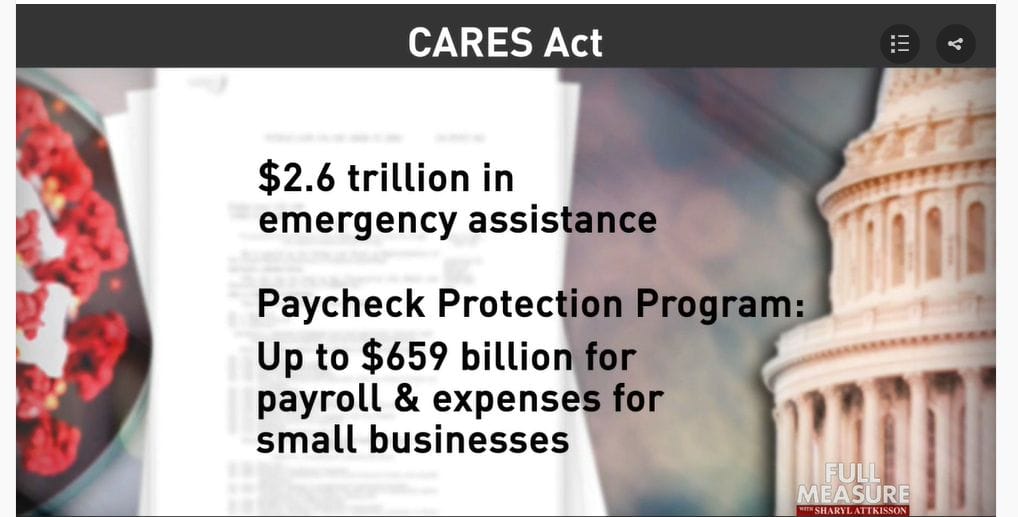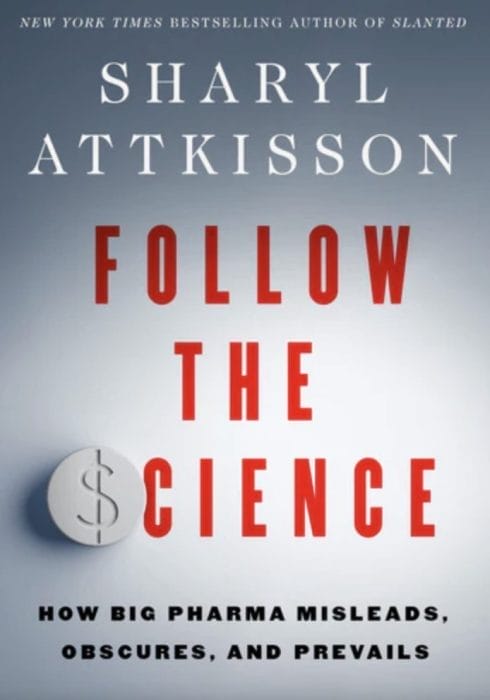There’s more tax money going toward coronavirus relief than anything comparable. The amount is more than double the so-called “stimulus” plan in 2009. Today, who’s following the money and what they’re finding.
Timothy Persons: That amount of money is typically going to have some amount of fraud.
Timothy Persons is a top analyst at the Government Accountability Office or GAO, one of the main agencies overseeing all the coronavirus spending.
The Coronavirus Aid, Relief, and Economic Security or CARES Act gives $2.6 trillion tax dollars in emergency assistance. Part of that is the Paycheck Protection Program or PPP, up to $659 billion for payroll and expenses to keep small businesses going.
Sharyl: If you can’t look at every penny, how do you decide what to track?
Persons: Well, our biggest task is we are under the CARES Act. GAO has a mandate to do ongoing oversight wherever it is necessary. Again, not just the size of the spend, but how it’s being spent. Is it being spent in a way that is accountable, that you can do proper financial accounting on it? Are we getting return on investment for it?
A big part of the job is watching for waste, fraud and abuse and there’s already been plenty of that.
Persons: The Comptroller General recently testified, and this was a top level finding that he had reported, is that there were still payments going to, for example, people who are deceased.
The head of the GAO, Gene Dodaro, told Congress the IRS knowingly sent out $1.4 billion in coronavirus relief payments to 1.1 million dead people, including his own mother who died more than two years before. Believe it or not, GAO says the IRS determined it “did not have the legal authority to deny payments to those who filed a return for 2019, even if they were deceased.”
Gene Dodaro: The IRS initially determined that deceased people, or anybody who filed a return in 2018 or 2019 should be paid, so they knew they were paying people who were deceased. Then it became known publicly, Treasury then reevaluated that position and stopped it.
Sharyl: When we’re talking about trillions of dollars, there are two opposing concerns. One of course is to get the money out the door as fast as possible to help people. The other is to try to make sure it’s not lost to waste fraud and abuse.
Persons: That’s right.
Sharyl: How do you balance that?
Persons: Yes. So that is the core issue and to protect in our role at GAO to help Congress look out and to protect the American taxpayer, the investments and things. There’s also a specialized unit that has stood up on the pandemic.
Some of the oversight involves crimes.
Acting Assistant Attorney General Brian C. Rabbitt: Unfortunately, almost every crisis brings out not only those that seek to help others, but those who try to exploit the situation for their own unlawful purposes and financial gain.
The Justice Department has charged more than four dozen people with trying to steal $175 million through the Paycheck Protection Program.
Former NFL player Josh Bellamy is accused of fraud after getting more than $1.2 million in coronavirus relief money. Prosecutors allege he bought $104,000 in luxury items and jewelry at places like Dior and Gucci, spent $62 thousand dollars at the Seminole Hard Rock Hotel and Casino, and applied for coronavirus money for family members and friends. Ten others are charged in the alleged scheme involving 90 fraudulent applications worth more than $24 million.
Reality TV star Maurice “Mo” Fayne of “Love & Hip Hop: Atlanta” got $3.7 million tax dollars for his business Flame Trucking. Prosecutors say he used $1.5 million of it to buy a Rolls Royce, diamonds and other jewelry, and make $40-thousand dollars in child support payments.
And David Hines allegedly used $3.9 million in COVID-Relief Funds in part to buy a $318,000 Lamborghini Sports Car and $8,500 worth of jewelry, and go on a $4,600 shopping spree at Saks Fifth Avenue.
Persons says one lesson we should have learned after the 2009 stimulus program is that we need a new and better strategic plan when it comes to this sort of spending on such a massive scale.
Persons: I think you really do need a George Marshall kind of person looking across strategically and being able to be both broad and deep on the issues so that entire system can be built so that we are more responsive and things.
General George Marshall spearheaded the Marshall Plan after World War II to help rebuild Europe and spur a remarkable economic recovery.
Persons: We haven’t been as prepared as we could have been for this disease or for prior pandemics or other outbreaks of things. And so I really do think the ounce of prevention is worth a pound of cure.
Sharyl (on camera): All of those we mentioned who were charged have either said they aren’t guilty, or are awaiting a date to enter a plea.
https://fullmeasure.news/news/follow-the-money/gao-coronavirus




To put it all in perspective, Sharyl :
Rothschild banking ASSETS are not held in our M O N O P O L Y paper “money” (( pieces of paper!, each one of which $1-dollar denomination REPRESENTS not what YOU OWN but what YOU OWE :
—about $100,000 FROM each man, each woman, and each child living in America today—OWES TO REMEDY Washington’s unfunded debts and over-spending (( some analysts target a much higher debt OWED by each one of us )) :
THAT CENTURIES-OLD banking house/family — the invisible hand destroying the West for that Marxist, Bernie-/Democrat-type INSANITY! — holds over $4oo-trillion in HARD assets, N O T any debt-ruined paper currencies held by the rest of us (( from Rothschilds to Soros to HELL-on-EARTH for everyone else )),
Our Rothschild-imposed Federal Reserve is neither a federal agency nor a reserve. Extrapolate that !
-Rick